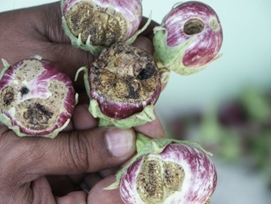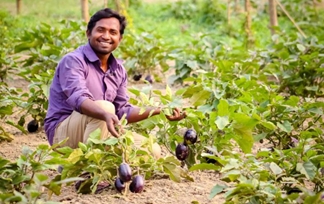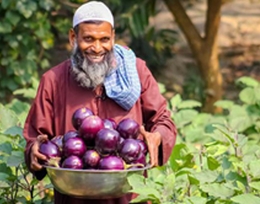Insect Resistant Brinjal/Talong/Aubergine/Eggplant
|
|
Bangladeshi farmers enjoy success from GM brinjal resistant to insect pests:
Known in South Asia as brinjal, eggplant is a vital food staple important in the diets of more than a billion people. Serious insect pests have historically required intensive treatment with potentially dangerous pesticides. Biotechnology has provided a proven alternative.
Although aubergine/eggplant is an important minor crop in a number of industrial nations in temperate latitudes, it is far more central to the diets of many in tropical/developing countries. But it is perhaps nowhere more important than in South Asia, particularly India and Bangladesh, where more than 150 varieties are grown. Butterfly and moth pests are a widespread problem, but the fruit and shoot borer is so severe a pest that in Bangladesh it typically requires 80-100 pesticide spray treatments in a season, and sometimes as many as 150 to enable farmers to have anything left to harvest for themselves. It is not difficult to understand, therefore, why Bangladeshi farmers were eager to participate in field trials of a biotech improved variety that promised to produce healthy harvests with no need for spraying to control the principal lepidopteran pest (Bt Eggplant: A new option for farmers in Bangladesh; Farmers' Perspectives: Bt Brinjal in Bangladesh; Bangladesh's genetically modified eggplants).
Developed by local public sector scientists in Bangladesh, this biotech derived solution to a serious problem has been strongly opposed by special interest NGOs. These campaigners have misrepresented the realties farmers have experienced (BBC dismisses anti-GMO activist complaints over Panorama film's portrayal of Bangladesh Bt brinjal project; Bt brinjal in Bangladesh - the true story). They have gone so far as to file an ethics complaint over a BBC documentary, which when compared with the facts has been shown completely without merit (Editorial Standards Findings).
Bangladeshi authorities expect that by 2020 biotech improved insect resistant brinjal varieties will be grown by smallholders on as much as 40% of the land devoted to brinjal in Bangladesh. "Experimental data indicate that Bt brinjal can improve yield by at least 30% and reduce the number of insecticide applications by a massive 70-90% resulting in a net economic benefit of YS$1,868 per hectare... Bt brinjal is estimated to have the capacity to generate a net additional economic benefit of US$200 million per year for around 150,000 brinjal growers in Bangladesh. Consumers will benefit from a cleaner, improved and more affordable food product" (The status of commercialized Bt Brinjal in Bangladesh).
Bt brinjal has also been developed for farmers in India and the Philippines (where it is known as talong) though in both cases NGO driven opposition has manufactured unfounded controversy and spread fears that have so far denied farmers access to this safe and effective improved crop.
|
|
|








